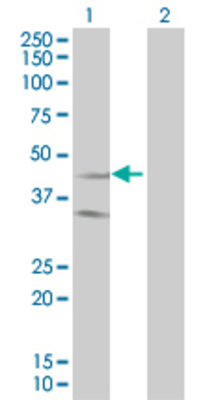| Gene Symbol |
SSTR2
|
| Entrez Gene |
6752
|
| Alt Symbol |
-
|
| Species |
Human
|
| Gene Type |
protein-coding
|
| Description |
somatostatin receptor 2
|
| Other Description |
SRIF-1|SS2R|somatostatin receptor type 2
|
| Swissprots |
Q9BWH1 Q4VBP0 P30874 B2R9P7 A8K3Y0 Q96TF2 Q96GE0
|
| Accessions |
AAA58248 AAC98545 AAF42809 AAF42810 AAO92064 BAC06126 CBE74681 CBX87732 CBX87733 CDM63481 EAW89111 EAW89112 P30874 AK093950 AK290745 BAF83434 AK313866 BAG36594 BC000256 AAH00256 BC009522 AAH09522 BC019610 AAH19610 BC095495 AAH95495 BT019926 AAV38729 DQ891280 ABM82206 NM_001050 NP_001041
|
| Function |
Receptor for somatostatin-14 and -28. This receptor is coupled via pertussis toxin sensitive G proteins to inhibition of adenylyl cyclase. In addition it stimulates phosphotyrosine phosphatase and PLC via pertussis toxin insensitive as well as sensitive G proteins. Inhibits calcium entry by suppressing voltage-dependent calcium channels. Acts as the functionally dominant somatostatin receptor in pancreatic alpha- and beta-cells where it mediates the inhibitory effect of somatostatin-14 on hormone secretion. Inhibits cell growth through enhancement of MAPK1 and MAPK2 phosphorylation and subsequent up-regulation of CDKN1B. Stimulates neuronal migration and axon outgrowth and may participate in neuron development and maturation during brain development. Mediates negative regulation of insulin receptor signaling through PTPN6. Inactivates SSTR3 receptor function following heterodimerization. {ECO:0000269|PubMed:15231824, ECO:0000269|PubMed:18653781, ECO:0000269|PubMed:19434240, ECO:0000269
|
| Subcellular Location |
Cell membrane; Multi-pass membrane protein. Cytoplasm. Note=Located mainly at the cell surface under basal conditions. Agonist stimulation results in internalization to the cytoplasm.
|
| Tissue Specificity |
Expressed in both pancreatic alpha- and beta- cells (at protein level). Expressed at higher levels in the pancreas than other somatostatin receptors. Also expressed in the cerebrum and kidney and, in lesser amounts, in the jejunum, colon and liver. In the developing nervous system, expressed in the cortex where it is located in the preplate at early stages and is enriched in the outer part of the germinal zone at later stages. In the cerebellum, expressed in the deep part of the external granular layer at gestational week 19. This pattern persists until birth but disappears at adulthood. {ECO:0000269|PubMed:19434240, ECO:0000269|PubMed:22932785}.
|
| Top Pathways |
Gastric acid secretion, cAMP signaling pathway, Neuroactive ligand-receptor interaction
|


![Western Blot: Somatostatin Receptor 2 Overexpression Lysate (Adult Normal) [NBL1-16478] Left-Empty vector transfected control cell lysate (HEK293 cell lysate); Right -Over-expression Lysate for Somatostatin Receptor 2.](http://www.bioprodhub.com/system/product_images/cel_products/5/sub_2/800_Somatostatin%2520Receptor%25202%2520Overexpression%2520Lysate%2520(Adult%2520Normal)-Western%2520Blot-NBL1-16478-img0002.jpg)